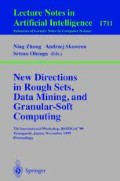Abstract
This paper presents an integration of the dynamic logic semantics and rational decision theory. Logics for reasoning about the expected utilities of actions are proposed. The well-formed formulas of the logics are viewed as the possible goals to be achieved by the decision maker and the truth values of the formulas are considered as the utilities of the goals. Thus the logics are many-valued dynamic logics. Based on different interpretations of acts in the logics, we can model different decision theory paradigms, such as possibilistic decision theory and case-based decision theory.
Access this chapter
Tax calculation will be finalised at checkout
Purchases are for personal use only
Preview
Unable to display preview. Download preview PDF.
References
Dubois, D., Prade, H.: Possibility theory as a basis for qualitative decision theory. In: Proc. of the 14th International Joint Conference on Artificial Intelligence, pp. 1924–1930. Morgan Kaufmann Publishers, San Francisco (1995)
Dubois, D., Prade, H.: Constraint satisfaction and decision under uncertainty based on qualitative possibility theory. In: Proc. of the 6th IEEE International Conference on Fuzzy Systems, pp. 23–30 (1997)
Dubois, D., Prade, H.: Possibilistic logic in decision. In: Proc.of the ECAI 1998 Workshop: Decision Theory Meets Artificial Intelligence-Qualitative and Quantitative Approaches, pp. 11–21 (1998)
Esteva, F., Garcia, P., Godo, L., Rodriguez, R.: A modal account of similarity-based reasoning. International Journal of Approximate Reasoning, 235–260 (1997)
Fargier, H., Lang, J., Sabbadin, R.: Towards qualitative approaches to multistage decision making. In: Proc. of the 6th International Conference on Information Processing and Management of Uncertainty in Knowledge-Based Systems, pp. 31–36 (1996)
De Giacomo, G., Lenzerini, M.: PDL-based framework for reasoning about actions. In: Gori, M., Soda, G. (eds.) AI*IA 1995. LNCS (LNAI), vol. 992, pp. 103–114. Springer, Heidelberg (1995)
Gilboa, I., Schmeidler, D.: Case-based decision: An extended abstract. In: Prade, H. (ed.) Proc. of the 13th European Conference on Artificial Intelligence, pp. 706–710. John Wiley & Sons Ltd., Chichester (1998)
Godo, L., Rodriguez, R.: A similarity-based fuzzy modal logic (1998) (preprint)
Hájek, P.: Metamathematics of Fuzzy Logic. Kluwer Academic Publisher, Dordrecht (1998)
Harel, D.: Dynamic logic. In: Gabbay, D.M., Guenthner, F. (eds.) Handbook of Philosophical Logic. Extensions of Classical Logic, vol. II, pp. 497–604. D. Reidel Publishing Company, Dordrechtz (1984)
Jaffray, J.Y., Wakke, P.: Decision making with belief functions: compatibility and incompatibility with the sure-thing principle. Journal of Risk and Uncertainty 8, 255–271 (1994)
Kozen, D.: A probabilistic PDL. In: Proc. of the 15th ACM Symposium on Theory of Computing, pp. 291–297 (1983)
Liau, C.-J.: A logic for reasoning about action, preference, and commitment. In: Proc. of the 13th European Conference on Artificial Intelligence, pp. 552–556. John Wiley & Sons Ltd., Chichester (1998)
Zadeh, L.A.: Fuzzy sets as a basis for a theory of possibility. Fuzzy Sets and Systems 1(1), 3–28 (1978)
Author information
Authors and Affiliations
Editor information
Editors and Affiliations
Rights and permissions
Copyright information
© 1999 Springer-Verlag Berlin Heidelberg
About this paper
Cite this paper
Liau, CJ. (1999). Many-Valued Dynamic Logic for Qualitative Decision Theory. In: Zhong, N., Skowron, A., Ohsuga, S. (eds) New Directions in Rough Sets, Data Mining, and Granular-Soft Computing. RSFDGrC 1999. Lecture Notes in Computer Science(), vol 1711. Springer, Berlin, Heidelberg. https://doi.org/10.1007/978-3-540-48061-7_36
Download citation
DOI: https://doi.org/10.1007/978-3-540-48061-7_36
Publisher Name: Springer, Berlin, Heidelberg
Print ISBN: 978-3-540-66645-5
Online ISBN: 978-3-540-48061-7
eBook Packages: Springer Book Archive

